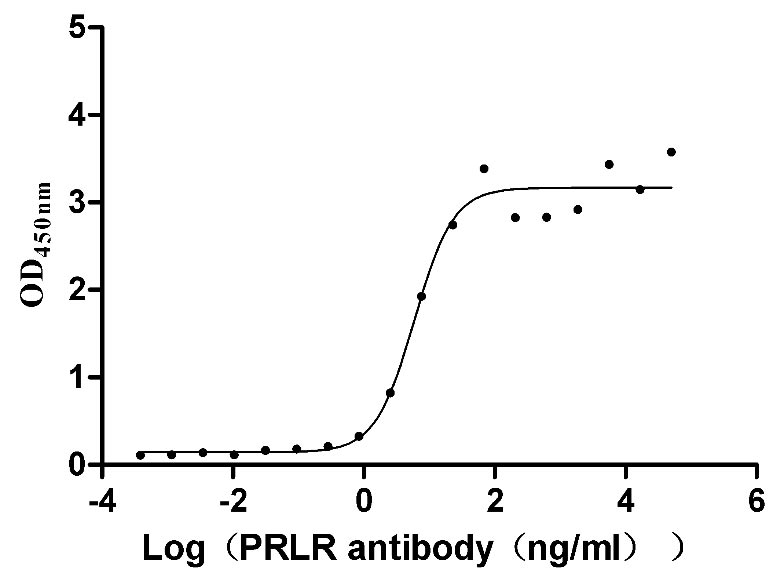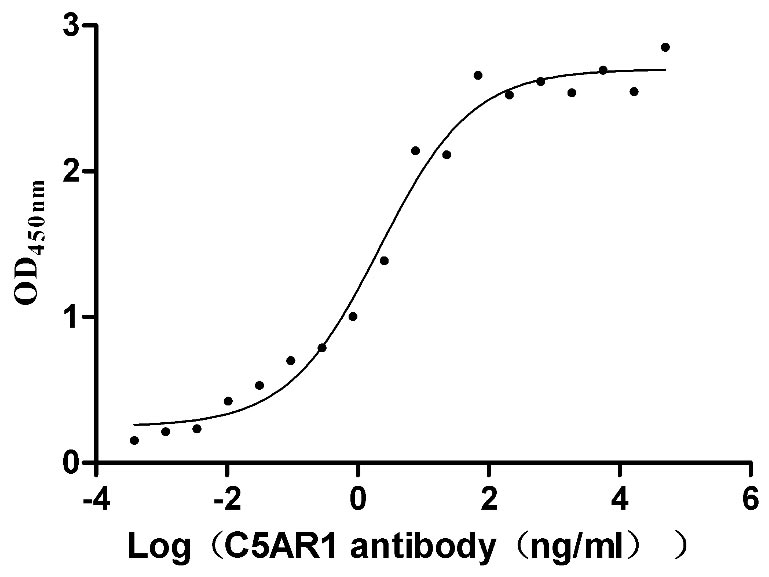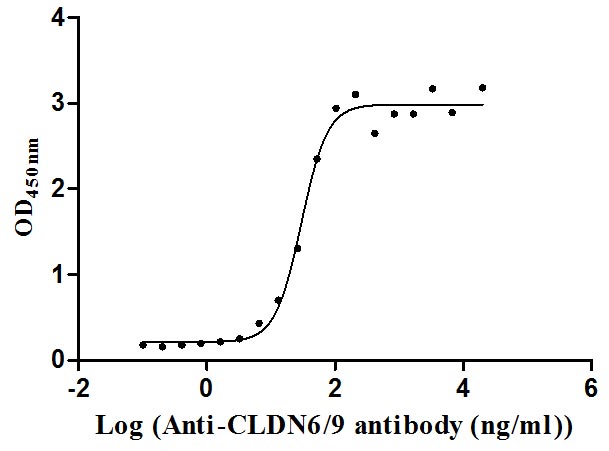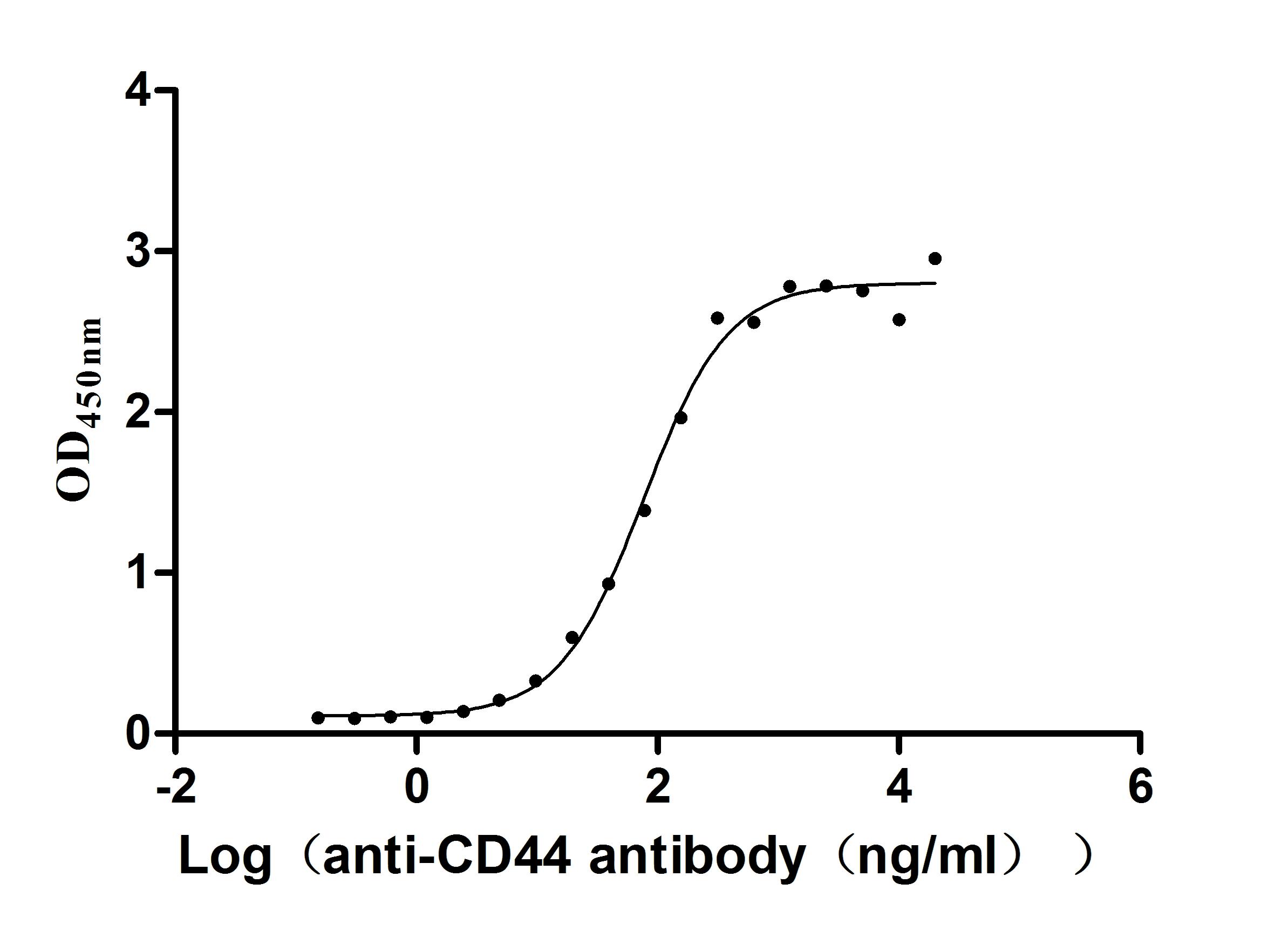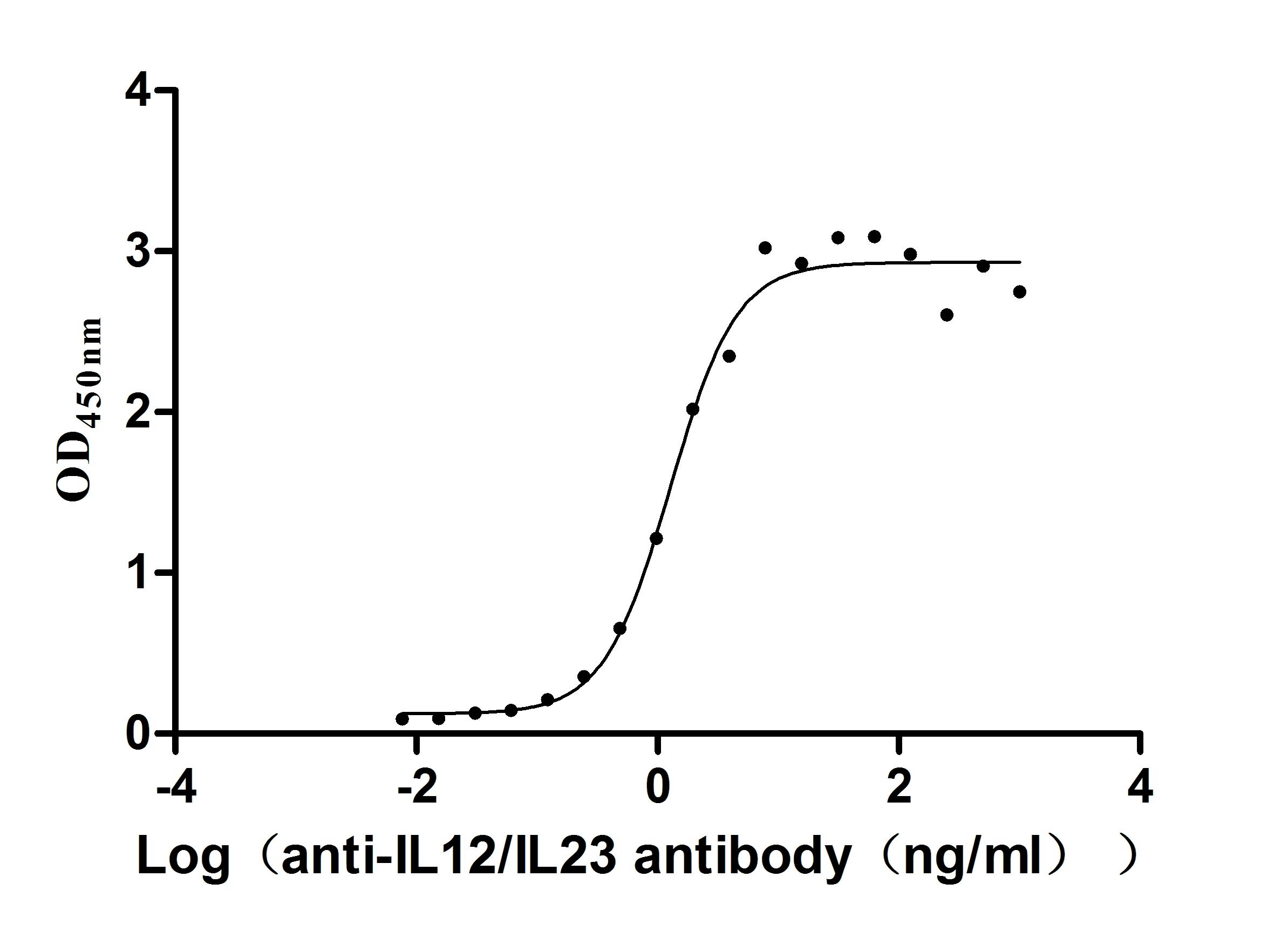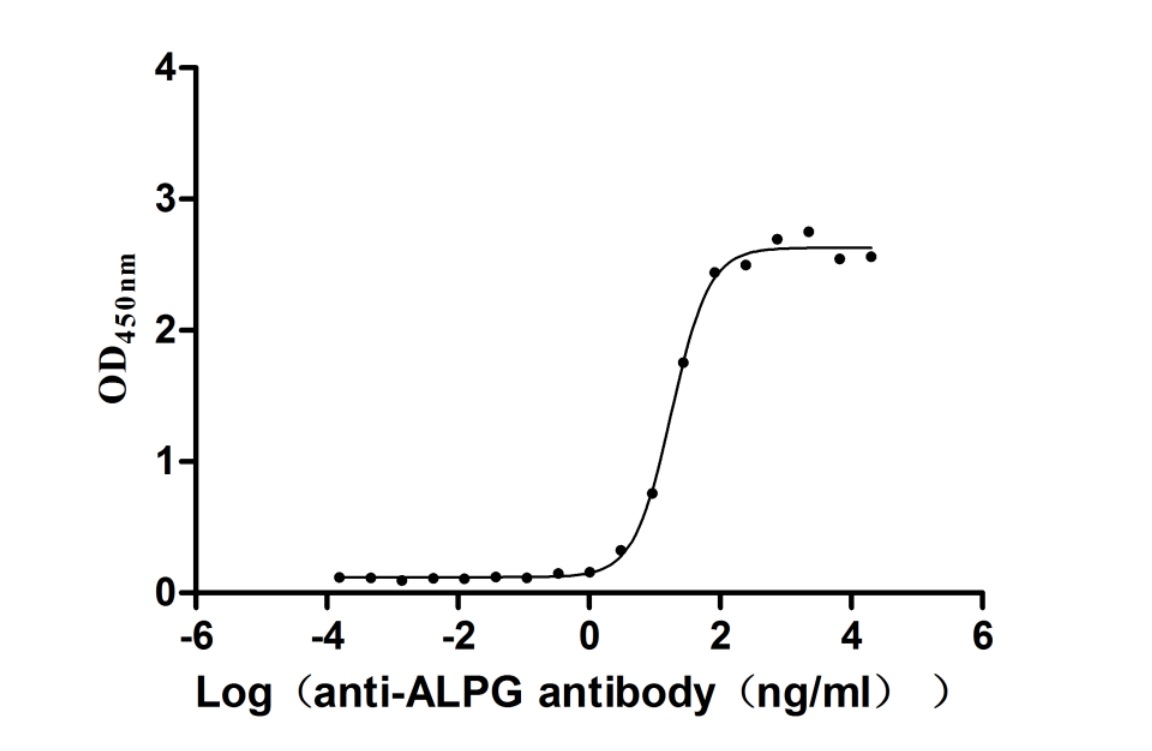Recombinant Human C-C motif chemokine 22 protein (CCL22) (Active)
In Stock产品详情
-
纯度:>97% as determined by SDS-PAGE.
-
内毒素:Less than 1.0 EU/μg as determined by LAL method.
-
生物活性:Fully biologically active when compared to standard. The biological activity determined by a chemotaxis bioassay using human T-lymphocytes is in a concentration range of 10-100 ng/ml.
-
基因名:
-
Uniprot No.:
-
别名:A 152E5.1; ABCD 1; ABCD1; C C motif chemokine 22; CC chemokine STCP 1; CC chemokine STCP-1; ccl 22; Ccl22; CCL22_HUMAN; Chemokine (C C motif) ligand 22; DC/B CK; DCBCK; Macrophage-derived chemokine; MDC; MDC(1-69); MDC(7-69); MGC34554; SCYA22; Small inducible cytokine subfamily A (Cys Cys) member 22; Small inducible cytokine subfamily A; member 22; Small-inducible cytokine A22; STCP 1; STCP1; Stimulated T cell chemotactic protein 1 ; Stimulated T-cell chemotactic protein 1
-
种属:Homo sapiens (Human)
-
蛋白长度:Full Length of Mature Protein
-
来源:E.Coli
-
分子量:8.1 kDa
-
表达区域:25-93aa
-
氨基酸序列GPYGANMEDS VCCRDYVRYR LPLRVVKHFY WTSDSCPRPG VVLLTFRDKE ICADPRVPWV KMILNKLSQ
-
蛋白标签:Tag-Free
-
产品提供形式:Liquid or Lyophilized powder
Note: We will preferentially ship the format that we have in stock, however, if you have any special requirement for the format, please remark your requirement when placing the order, we will prepare according to your demand. -
缓冲液:Lyophilized from a 0.2 μm filtered concentrated solution in 20 mM PB, pH7.4, 500 mM NaCl
-
储存条件:Store at -20°C/-80°C upon receipt, aliquoting is necessary for mutiple use. Avoid repeated freeze-thaw cycles.
-
保质期:The shelf life is related to many factors, storage state, buffer ingredients, storage temperature and the stability of the protein itself.
Generally, the shelf life of liquid form is 6 months at -20°C/-80°C. The shelf life of lyophilized form is 12 months at -20°C/-80°C. -
货期:5-10 business days
-
Datasheet & COA:Please contact us to get it.
相关产品
靶点详情
-
功能:May play a role in the trafficking of activated/effector T-lymphocytes to inflammatory sites and other aspects of activated T-lymphocyte physiology. Chemotactic for monocytes, dendritic cells and natural killer cells. Mild chemoattractant for primary activated T-lymphocytes and a potent chemoattractant for chronically activated T-lymphocytes but has no chemoattractant activity for neutrophils, eosinophils, and resting T-lymphocytes. Binds to CCR4. Processed forms MDC(3-69), MDC(5-69) and MDC(7-69) seem not be active.
-
基因功能参考文献:
- MDC might serve as a marker of pharmacological therapy response in major depressive disorder PMID: 28898872
- blood CCL22 levels were positively associated with IgE sensitization at age 2. A high cord blood CCL22/CXCL10 chemokine ratio was significantly associated with a higher risk of allergic sensitization at age 3. PMID: 27863395
- Tumor-associated macrophages promote prostate cancer migration through activation of the CCL22-CCR4 signaling axis. PMID: 28039457
- Elevations in serum MDC and BLC were independently associated with the significant risk of early stage lung adenocarcinoma, even in non-smokers and in stage IA patients. PMID: 27811371
- CCL22 plays an important role in supporting gastric cancer development presumably by increasing the percentage of regulatory T cells in the tumor microenvironments. CCL22 levels in sera have a predictive value for gastric cancer peritoneal metastasis and the early recurrence. PMID: 28501127
- The CCL22-mediated enhancement of antitumor responses is however not due to conversion, but rather to redirection of existing regulatory T cells to the site of cutaneous overexpression. PMID: 27634754
- CCL22 and IL-37 with a co-localization in non-small cell lung cancer A549 cells inhibited the proliferation and epithelial-mesenchymal transition process PMID: 27499437
- Our results demonstrate that CCL22 is expressed in human placenta. Decidual expression was only observed in miscarriage conditions and correlates with Treg infiltration. PMID: 25922986
- Distinctive Treg associated CCR4-CCL22 expression profile with altered frequency of Th17/Treg cell in the immunopathogenesis of Pemphigus Vulgaris. PMID: 26093920
- type I IFN blocks the regulatory T cell-attracting chemokine CCL22 and thus helps limit the recruitment of regulatory T cells to tumors PMID: 26432403
- First-episode psychosis patients had higher serum CCL22, which decreased substantially following antipsychotic treatment. PMID: 25970596
- Elevated levels of CCL22 found in the ascites could create a chemokine gradient aiding in Treg cells migration. Increased Tregs percentage in the local microenvironment of ovarian cancer might be an important mechanism of immunosuppression. PMID: 25647263
- Circulating CCL22 levels are related to both glioma risk and survival duration independent of age, histology, grade and IDH mutation status. CCL22 should be considered a marker of immune status with potential prognostic value PMID: 25604093
- CCL22 is a novel mediator of lung inflammation following hemorrhage and resuscitation PMID: 25136780
- CCR4 C1014T and CCL22 C16A genetic variations were neither associated with the risk, nor with the progression of colorectal cancer in Iranian population PMID: 25148803
- The serum CCL22 levels were affected by genetic variations at SNP rs223818. Accordingly, SNP rs223818 may play a role in the susceptibility to breast cancer. PMID: 25722218
- Sesamin suppressed lipopolysaccharide induced CCL22 expression in monocytes through the ER/PPAR-a, the MAPK-p38 pathway, the NFkB-p65 pathway and the epigenetic regulation by suppressing histone H3/H4 acetylation in the CCL22 promoter region. PMID: 25117529
- CCL22 could be an immune marker in ANCA-associated vasculitis. PMID: 25352172
- Suggest that lower CCL22 levels may play an important role in the pathogenesis of multiple sclerosis in women. PMID: 24254331
- CCL22 is an antimicrobial protein with bacteriocidal activity against E. coli and S. aureus. PMID: 12949249
- genetic polymorphism is not associated with breast carcinoma in Southern Iranian population PMID: 23268288
- both CCL22 and TGF-beta1 are candidate chemoattractants for intratumoral Foxp3 (+)Tregs infiltration; however, unlike the later, CCL22 is an independent prognostic predictor of BC patients. PMID: 24124553
- Autistic children had significantly higher serum levels of MDC than healthy controls PMID: 23782855
- Data suggest that decreased levels of plasmatic CCL22 may contribute to CD4(+) lymphopaenia. PMID: 23265706
- lymph node metastasis of CCR4(+) HNSCC is promoted by CCL22 in an autocrine or M2-like macrophage-dependent paracrine manner. PMID: 23180648
- High cord blood levels of the Th2 related chemokine CCL22 were significantly associated with high total- IgE levels during the first 6 years of life, but not with specific sensitization, asthma, eczema or allergic rhinitis. PMID: 23106659
- findings suggest that HBV infection and activity of the TGF-beta-miR-34a-CCL22 axis serve as potent etiological factors to predispose hepatocellular carcinoma patients for the development of portal vein tumor thrombus PMID: 22975373
- results suggested that suppression of the CCL22 gene using Salmonella induced anti-inflammatory effects PMID: 21823987
- Data suggest that variants of C-C motif chemokine 22 (CCL22) play a role in susceptibility to atopic dermatitis (AD) in a gain-of-function manner. PMID: 22125604
- chemokine CCL22 may have a role in abdominal aortic aneurysm PMID: 20348247
- CCL22 may be responsible for the infiltration of CD4(+)CD25(high) T cells into the pleural space of patients with tuberculous pleurisy. PMID: 20337996
- Plasma concentration of CCL22 correlates with the frequency of circulating CD4-positive FoxP3-positive (CD4+FoxP3+) regulatory T cells (Tregs) in human T-lymphotropic virus (HTLV) type 1-infected subjects. PMID: 20525891
- Endocrine disrupting chemicals suppressed CCL22 and IP-10 levels in cultured monocytes via, at least in part, the MKK1/2-ERK MAPK pathway and histone H4 acetylation. PMID: 19756997
- Data show that MDC/CCL22 is present in the synovial membrane of rheumatoid arthritis (RA) and psoriatic arthritis (PsA) patients and in synovial fluid of patients with RA and PsA, which would enable migration of CCR4 expressing memory cells. PMID: 19942450
- Chronic lymphocytic leukemia B cells are endowed with the capacity to attract CD4+, CD40L+ T cells by producing CCL22, suggesting a vicious circle, leading to the progressive accumulation of the neoplastic cells. PMID: 11981828
- Neither MDC release nor MDC mRNA was detected in any of the 3 types of fibroblasts stimulated with any of the cytokines examined. PMID: 12642832
- Serum levels of TARC and MDC in atopic dermatitis patients were significantly higher than those found in normal controls. PMID: 15113590
- CCL22 induced accumulation of phosphatidylinositol-(3,4,5)-trisphosphate in the leukemic T cell line CEM. CCL22 also had the ability to chemoattract human Th2 cells and CEM cells in a pertussis toxin-sensitive manner. PMID: 15187160
- CCL17 and CCL22, which are constitutively produced by immature DCs, mediate both T cell polarization and attraction. PMID: 15210758
- Elevated bronchial mucosal expression of MDC/CCL22 is implicated in asthma pathogenesis; its action is partly through selective development and retention, or recruitment of T helper type 2, not Th1, receptor-bearing cells. PMID: 15944327
- MDC/CCL22 has a role in inhibiting progression of lung cancer PMID: 16453150
- These data suggest that the CCL22 level produced by monocyte derived dendritic cells thus reflects the disease activity of Atopic dermatitis (AD) and it may also play an important role regarding the production of CCL22 in the pathogenesis of AD. PMID: 17008059
- A trend towards a decreased allelic frequency of the A allele of the CCL22 C/A SNP as well as of the T allele of the CCL17 C/T SNP was found in MS patients compared with controls. PMID: 17967467
- HTLV-1-infected T cells produce CCL22 through Tax and selectively interact with CCR4+CD4+ T cells, resulting in preferential transmission of HTLV-1 to CCR4+CD4+ T cells. PMID: 18178833
- MDC/CCL22 is likely to play a role in the development of multiple sclerosis in females only, possibly influencing the intracerebral recruitment of Th2 cells, which produce anti-inflammatory cytokines PMID: 18208895
- Significantly higher CCL22 expression is associated with gastric cancer PMID: 18224687
- although IE86 does repress the UL144-mediated activation of a synthetic NFkB promoter, it is unable to block UL144-mediated activation of the CCL22 promoter, and this lack of responsiveness to IE86 appears to be regulated by binding of CREB. PMID: 18287226
- serum CCR4 ligands (CCL17 and CCL22)may be useful inflammatory markers for assessing atopic dermatitis severity in children PMID: 18435706
- Development of allergic disease is associated with a more marked Th2-like deviation already at birth, shown as increased levels of cord blood IgE and MDC (CCL22) and higher ratios of MDC (CCL22) to IP-10 (CXCL10) and I-TAC (CXCL11). PMID: 19175890
- Regulatory T cells recruited through CCL22/CCR4 are selectively activated in lymphoid infiltrates surrounding primary breast tumors and lead to an adverse clinical outcome. PMID: 19244125
显示更多
收起更多
-
亚细胞定位:Secreted.
-
蛋白家族:Intercrine beta (chemokine CC) family
-
组织特异性:Highly expressed in macrophage and in monocyte-derived dendritic cells, and thymus. Also found in lymph node, appendix, activated monocytes, resting and activated macrophages. Lower expression in lung and spleen. Very weak expression in small intestine. I
-
数据库链接:
HGNC: 10621
OMIM: 602957
KEGG: hsa:6367
STRING: 9606.ENSP00000219235
UniGene: Hs.534347
Most popular with customers
-
Recombinant Human Glypican-3 (GPC3) (G537R), partial (Active)
Express system: Mammalian cell
Species: Homo sapiens (Human)
-
Recombinant Mouse Prolactin receptor (Prlr), partial (Active)
Express system: Mammalian cell
Species: Mus musculus (Mouse)
-
Recombinant Human C5a anaphylatoxin chemotactic receptor 1 (C5AR1)-VLPs (Active)
Express system: Mammalian cell
Species: Homo sapiens (Human)
-
Recombinant Human Claudin-9 (CLDN9)-VLPs (Active)
Express system: Mammalian cell
Species: Homo sapiens (Human)
-
Recombinant Macaca fascicularis CD44 antigen (CD44), partial (Active)
Express system: Mammalian cell
Species: Macaca fascicularis (Crab-eating macaque) (Cynomolgus monkey)
-
Recombinant Human IL12B&IL12A Heterodimer Protein (Active)
Express system: Mammalian cell
Species: Homo sapiens (Human)
-
Recombinant Human Desmoglein-3 (DSG3), partial (Active)
Express system: Baculovirus
Species: Homo sapiens (Human)
-
Recombinant Human Alkaline phosphatase, germ cell type (ALPG) (Active)
Express system: Mammalian cell
Species: Homo sapiens (Human)

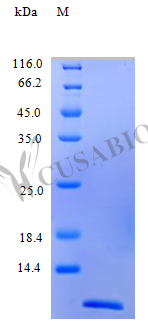

-AC1.jpg)
